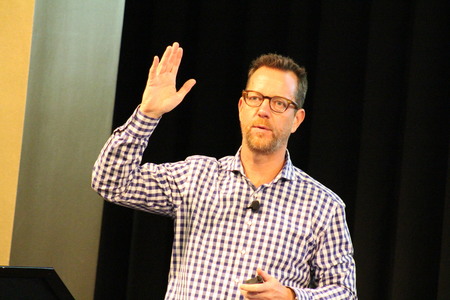At the recent Page Society Insight Forum, convened at The Home Depot's Store Support Center in Atlanta, much of the focus centered on the essential importance of strong corporate cultures. Notice, by the way, that Home Depot doesn't call its impressive center the "Corporate Headquarters." The company purposely places the emphasis on its field stores, and the staff employees, including CEO Frank Blake, constantly remind themselves they work there solely to support those who serve the paying customers. Not the other way around.
If only more corporate boards of directors could have been in the room. They would have heard passionate presentations from people like Bill Myers, VP of Communications, Marketing and CSR for DaVita HealthCare Partners (pictured). Myers described the DaVita culture, which places community first and company second; that behaves in many ways like a village; that uses tactics such as fight songs and corporate pep rallies to strengthen the bonds among employees and the patients they serve. This focus on culture has yielded impressive results that even hard-boiled directors could understand, with revenues and a share price that have both more than doubled in the last four years.
They would have also heard from the forum's host, Brad Shaw, VP of Communications and External Affairs for The Home Depot, who shared the critical importance placed on core values by Blake and other leaders at the company. Home Depot uses an inverted pyramid, first developed years ago by the company founders, that puts frontline employees at the top in terms of importance and senior management at the bottom. The job of the senior team is to empower those who serve the customers to deliver unparalleled customer satisfaction. Shaw illustrated the power of the pyramid by showing how employees reacted in times of crisis to meet the human needs of their customers and communities.
The forum also included honest portrayals of the way companies responded to changing business conditions, confront mistakes, and manage risks. Through it all, the relationship between CEO leadership, CCO engagement, and corporate values and culture were fully examined. I think any director of a public company would have been fascinated by the discussion.
I found myself wondering about how much these issues are considered whenever boards are entrusted with what is arguably their most critical responsibility, the selection of a new CEO. Some of the speakers were asked how dependent their cultures were on the personal commitment of the CEO. They acknowledged that the CEO's vision and dedication were critical, but they also felt that the strongest elements of the culture were so embedded in their organizations that they would continue even under a new CEO.
But, still, I wonder.
I know that boards have become highly sensitive to the organizational risks posed by reputational meltdowns. One need only look at the examples provided by BP, Toyota, GM, HP, Target and countless others in the last few years. Board members know these stories as well as any of us do.
I'm not sure, however, that a majority of these directors consider the relationship between values, culture and reputation when they are seeking new leaders for the companies they serve. But they should. We all know of examples when high-profile CEOs have been hired based on their track records at other organizations. These new CEOs sometimes bring skills honed in one corporate culture only to find that they don't work the same way in the new company.
It's a little bit like geography. If you grew up in Sydney, Australia and you move to Nice, France, you find that customs, culture, manners and expectations are quite different and you have to adapt. Companies have unique cultures, values, beliefs, practices, language and behaviors that must also be considered. Board members would be well served by giving this reality ample consideration when recruiting and selecting CEOs.
